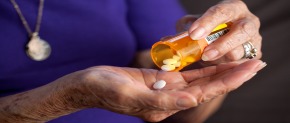Avoiding adverse drug reactions
Know the drugs that could cause potential problems.
BY: Dr Mario Trucillo
 Adverse Drug Reactions (ADR) is an adverse reaction that occurs and is directly attributable to the drug itself. These can include drug interactions, accidental overdose, adverse effects and allergic reactions among other things. ADRs are a considerable health and safety issue, and a leading cause of morbidity and mortality in healthcare. They also constitute a large burden on the healthcare system.
Adverse Drug Reactions (ADR) is an adverse reaction that occurs and is directly attributable to the drug itself. These can include drug interactions, accidental overdose, adverse effects and allergic reactions among other things. ADRs are a considerable health and safety issue, and a leading cause of morbidity and mortality in healthcare. They also constitute a large burden on the healthcare system.
ADRs become increasingly more important in the elderly as the population over 65 increases, and can be both harmful and potentially life-threatening. The elderly are more susceptible due to multiple medications at once, age-related physiologic changes and more diseases associated with age.
Nursing homes and similar long-term care facilities comprise a large number of elderly patients. In a past US survey, there were more than 1.5 million Americans receiving care in nursing homes. Residents on average were using six medications, and some of which were using 10 or more. This study had estimated that roughly 350,000 ADRs were occurring each year in nursing homes and over half of these ADRs were due to unintentional overdose.
In a study published in the New England Journal of Medicine in 2011, it had estimated that almost 100,000 emergency hospitalisations occur each year in US. Half of these hospitalisations were among adults 80 years or older and a large proportion of those were preventable. (According to a 2012 study done by the Pharmaceutical Society of Singapore (PSS) and the Agency for Integrated Care (AIC) on a VWO-run nursing home in Singapore, residents were on an average on 7.5 drugs each.)
Most common drugs causing adverse reactions
Both US studies found that the anticoagulant warfarin ranked highest among elderly patients as the most frequently used drug that has caused adverse effects. Other anticoagulants that can have similar effects if not taken properly include Pradaxa (dabigatran) (blood-thinning medicine that reduces the risk of stroke and blood clots in people with atrial fibrillation not caused by a heart valve problem) and Lovenox (enoxaparin) (treatment for deep vein thrombosis).
In nursing homes, psychoactive drugs (such as antipsychotics, antidepressants and sedatives/hypnotics) were also a common cause of adverse reactions as well as being preventable.
Other drugs include:
- Insulin.
- Oral antiplatelet drugs (such as aspirin, prasugrel and dipyridamole).
- Oral hypoglycaemic agents (such as sulfonylureas, metformin and pioglitazone).
Tips to avoid problems
One way to prevent ADRs is to understand drug interactions. This can mean drug-drug, drug-food, and drug-dietary supplement. Talk to your prescribing doctor about the medicines you are taking and be wary of certain foods and beverages like alcohol and grapefruit juice, dietary supplements like St John’s Wort and vitamin E, and a host of drugs like Cordarone (amiodarone), antihistamines and Lanoxin (digoxin) that may interact with the medicines you are prescribed.
Here’s a list of tips to avoid problems:
- If required, keep up with any blood testing recommended by your doctor.
- Always read drug labels carefully and follow directions.
- Learn about the warnings for all the drugs you take.
- Keep medications in their original containers so that you can easily identify them.
- Ask your doctor what you need to avoid when you are prescribed a new medication. Ask about food, beverages, dietary supplements and other drugs.
- Check with your doctor or pharmacist before taking an over-the-counter drug if you are taking any prescription medications.
- Keep all of your healthcare professionals informed about everything that you take.
- Keep a record of all prescription drugs, over-the-counter drugs, and dietary supplements (including herbs) that you take. Try to keep this list with you at all times, especially when you go to a medical appointment.
Dr Mario Trucillo, based in the US, is an expert medical writer, editor and medical affairs consultant. He has worked as a medical director at various medical marketing and communications agencies, specifically with pharmaceutical and biotechnology clients across numerous therapeutic areas, including diabetes, cardiovascular disease (stroke prevention in atrial fibrillation, heart failure, CAD), oncology, vaccines and communicable diseases. This article has been reprinted with permission from the American Recall Center.
(** PHOTO CREDIT: American Recall Center)

I don’t trust long-term prescription drugs beyond two wks (even if no adverse reaction happens within this period ), as they can cause adverse side effects over the years. The problem is in USA, the FDA approves all new drugs but the actual testing is done by the big Pharma. So, obviously the big Pharma only submit the positive result & hide any side effects, which could only show up years later. Take VIOXX as an example. By the time the deadly side effects appeared years later, the said big Pharma had already made around $100 billion. When the victims’ families sued the big Pharma, they only got around $1 billion. That is really pittance, right? Hardly any justice for the victims. This is not one instance of drug failure. There is long list of similar drug failures over the yrs.